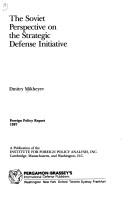| Listing 1 - 10 of 713 | << page >> |
Sort by
|

ISBN: 0080357482 Year: 1987 Publisher: Washington (D.C.) : Pergamon-Brassey's international defense publishers,
Abstract | Keywords | Export | Availability | Bookmark
 Loading...
Loading...Choose an application
- Reference Manager
- EndNote
- RefWorks (Direct export to RefWorks)
Book
ISBN: 9780947795153 0947795154 Year: 1986 Publisher: London: Fourth Estate,
Abstract | Keywords | Export | Availability | Bookmark
 Loading...
Loading...Choose an application
- Reference Manager
- EndNote
- RefWorks (Direct export to RefWorks)
Book
ISBN: 9780470643556 Year: 2012 Publisher: Hoboken, N.J. : Wiley,
Abstract | Keywords | Export | Availability | Bookmark
 Loading...
Loading...Choose an application
- Reference Manager
- EndNote
- RefWorks (Direct export to RefWorks)
Book
Year: 1986 Publisher: Jena : Universitätsbibliothek der Friedrich-Schiller-Universität Jena,
Abstract | Keywords | Export | Availability | Bookmark
 Loading...
Loading...Choose an application
- Reference Manager
- EndNote
- RefWorks (Direct export to RefWorks)
Book
ISBN: 240300202X 2403012025 Year: 1986 Publisher: Paris (77, rue du Faubourg-Saint-Antoine 75011) : Autrement,
Abstract | Keywords | Export | Availability | Bookmark
 Loading...
Loading...Choose an application
- Reference Manager
- EndNote
- RefWorks (Direct export to RefWorks)
Cette édition numérique a été réalisée à partir d'un support physique, parfois ancien, conservé au sein du dépôt légal de la Bibliothèque nationale de France, conformément à la loi n° 2012-287 du 1er mars 2012 relative à l'exploitation des Livres indisponibles du XXe siècle.
Book
ISBN: 0316458287 Year: 1985 Publisher: Little, Brown
Abstract | Keywords | Export | Availability | Bookmark
 Loading...
Loading...Choose an application
- Reference Manager
- EndNote
- RefWorks (Direct export to RefWorks)
Book
Year: 1989 Publisher: Gaithersburg, MD : U.S. Dept. of Commerce, National Institute of Standards and Technology,
Abstract | Keywords | Export | Availability | Bookmark
 Loading...
Loading...Choose an application
- Reference Manager
- EndNote
- RefWorks (Direct export to RefWorks)
Book
ISBN: 087124103X Year: 1986 Publisher: New York (N.Y.): Foreign policy association
Abstract | Keywords | Export | Availability | Bookmark
 Loading...
Loading...Choose an application
- Reference Manager
- EndNote
- RefWorks (Direct export to RefWorks)
Book
ISBN: 0941690253 Year: 1987 Publisher: Claremont Regina books
Abstract | Keywords | Export | Availability | Bookmark
 Loading...
Loading...Choose an application
- Reference Manager
- EndNote
- RefWorks (Direct export to RefWorks)
Reference-guide on SDI, including SDI technology and research, SDI and arms control and SDI and politics. Includes the text of the ABM treaty, 1972.
Book
Year: 2008 Publisher: Santa Monica, CA : RAND Corporation,
Abstract | Keywords | Export | Availability | Bookmark
 Loading...
Loading...Choose an application
- Reference Manager
- EndNote
- RefWorks (Direct export to RefWorks)
The purpose of the Proliferation Security Initiative (PSI) is to prevent or at least inhibit the spread of weapons of mass destruction, their delivery systems, and related materials to or from states or non-state actors whose possession of such items would be a serious threat to global or regional security. So far, 91 countries have officially affiliated with PSI and participate in its activities. However, five key nations, whose addition would enhance PSI's effectiveness, have so far been reluctant to do so. The authors look at the situation from the perspectives of these five "hold-out" nations -- Indonesia, Malaysia, India, Pakistan, and China -- to assess the disadvantages (costs) and advantages (benefits) that, when weighed against each other, have induced them to refrain from PSI affiliation. They then set out ways in which each country's costs-and-benefits balance might be altered to enhance the prospects of its deciding to affiliate with PSI in the near future. They also describe ideas that might be developed and steps that might be taken to enhance PSI's inclusiveness and effectiveness in the future.
| Listing 1 - 10 of 713 | << page >> |
Sort by
|

 Search
Search Feedback
Feedback About UniCat
About UniCat  Help
Help News
News